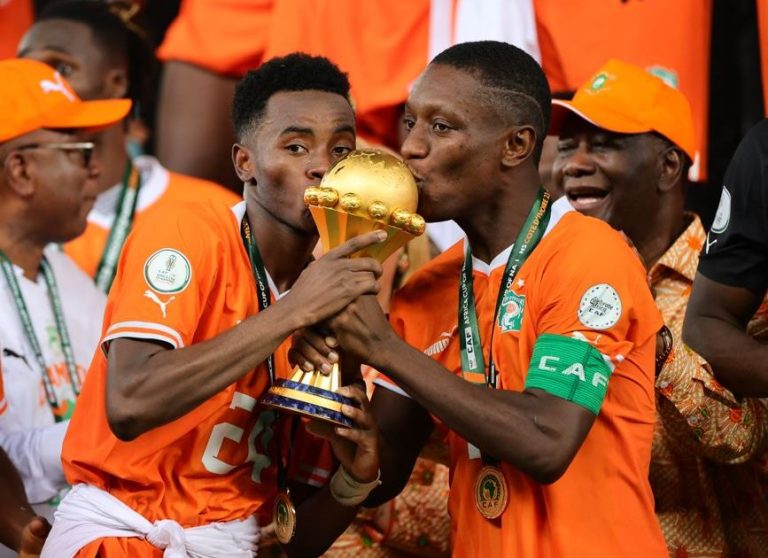In this report, EBENEZER BAJELA takes a look at Ivory Coast’s near elimination from the AFCON to conquering the continent
Tony La Russa, an American former professional baseball player, coach, and manager once said, “Just because you’re down to your last strike, you’re not out yet. You can always do more. You’ll always have more at-bats to take.”
La Russa’s assertion is a true reflection of Ivory Coast’s journey to triumph as they claimed the 34th edition of the Africa Cup of Nations on home soil.
Staring elimination right in the face after picking up just three points from their three games in the group stage and suffering a 4-0 humiliation in the hands of tournament surprise package, Equatorial Guinea, it looked like the Elephants’ journey at the AFCON was over.
According to Opta, the 4-0 loss to Equatorial Guinea in the last group match was the biggest shock in 34 editions of the Cup of Nations, stretching back more than six decades.
The heavy defeat left Ivory Coast on the brink of elimination but they squeezed through as lucky losers into the knockout stages, sacked their coach, Jean-Louis Gasset, the federation took a gamble – appointing inexperienced Emerse Fae as interim head coach.
“I told the players we were dead after the defeat against Equatorial Guinea, and we were resurrected after the Morocco game with Zambia,” Fae said immediately after taking charge of the Elephants.
The 40-year-old, on his birthday, was tossed into the turbulence with the hopes of a football-mad nation on his shoulders. The team was low on confidence and fractured after poor results. Yet somehow, Fae united the squad when it mattered most.
With luck on their side, the hosts scraped through the groups qualifying as one best third-place teams, setting up a daunting round-of-16 clash with Africa’s top-ranked team, Senegal.
Fae devised a masterful game plan to stifle Senegal, as the match finished 1-1 after extra time. In the penalty shootout, Ivory Coast held their nerves, winning 5-4 to advance.
“After that slap, it was difficult but it helped us come back even stronger to take our second chance and show everyone that we were the best,” said Ivorian midfielder Seko Fofana.
Following their win over Senegal, a quarter-final date with Mali followed, and again the Elephants left it late.
With the score 1-1 in extra time, Oumar Diakite popped up in the 119th minute to score and book their spot in the semi-finals.
Ivory Coast’s grit and determination were now on full display.
After a rather gruelling 1-0 semi-final win over DR Congo, the exhausted Elephants faced the prospect of five matches in just 16 days.
The final at the Stade Alassane Ouattara pitted Ivory Coast against rivals Nigeria, who were undefeated all tournament and once again Fae had a master plan to limit Nigeria’s attackers, as his side racked up 62 per cent of possession and kept Jose Peseiro’s men in their half.
The Ivorians beat Nigeria 2-1 in the final to complete a fairytale comeback after stumbling through the early stages and being handed the heaviest defeat ever suffered by a host country.
For a team that looked dead after the group phase of the tournament, it was remarkable having Simon Adingra named Best Young Player at The Tournament after his prominent role in their success.
The 22-year-old assisted both goals in the host nation’s comeback victory over Nigeria in Sunday’s final.
Ivory Coast’s drama at the AFCON also resembles Sebastien Haller’s last two and a half years.
The Ivorian returned from his battle with cancer to score the goal that helped the hosts lift the AFCON trophy.
Haller had already scored the winning goal in the semi-final against the DR Congo to secure a place in the final, and this was after missing the entirety of the group stage with injury.
“It was one of my main goals to give everything I could at the African Cup,” the Borussia Dortmund striker said.
Fofana is another player worthy of mention as the midfielder was at the heart of everything the Ivorians did to become champions.
And Fae, who was eventually named the Best Coach of the Tournament, says he can’t describe the overwhelmingly great feeling of guiding the Elephants to glory on home soil.
“I still find it hard to believe it. We went through all the emotions. This competition will mark my life, that’s for sure,” Fae told reporters after the game.
“I took the reins of the team, on my birthday and we were almost knocked out, yet things turned around thanks to the hard work of these players and today they have been rewarded and more importantly, they rewarded our loyal people.”
Ivory Coast’s success just goes to show that in football, magic can happen when opportunity meets preparation.
The 34th edition of the African showpiece, held in five states, has been tagged the best tournament on the continent by all standards.
The AFCON has always been a colourful spectacle often enlivened by controversies and many times also ridiculed for the poor standard of matches. Past tournaments too have been plagued by empty stands during matches not involving the hosts.
But the Ivory Coast, who put back the timing of the tournament six months to avoid the rainy season in West Africa, changed that perception, helped by a high quality of pitches and commendable attendance at most matches.
